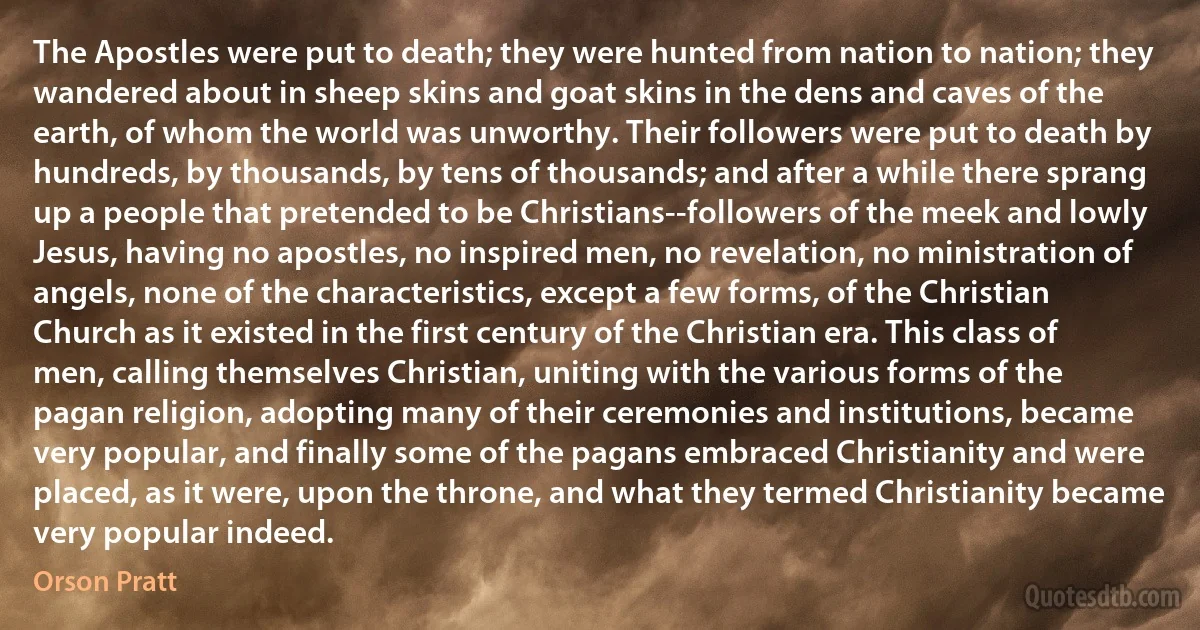
The Apostles were put to death; they were hunted from nation to nation; they wandered about in sheep skins and goat skins in the dens and caves of the earth, of whom the world was unworthy. Their followers were put to death by hundreds, by thousands, by tens of thousands; and after a while there sprang up a people that pretended to be Christians--followers of the meek and lowly Jesus, having no apostles, no inspired men, no revelation, no ministration of angels, none of the characteristics, except a few forms, of the Christian Church as it existed in the first century of the Christian era. This class of men, calling themselves Christian, uniting with the various forms of the pagan religion, adopting many of their ceremonies and institutions, became very popular, and finally some of the pagans embraced Christianity and were placed, as it were, upon the throne, and what they termed Christianity became very popular indeed.
Orson PrattRelated topics
calling century christian church death earth era few goat having men nation none people religion sheep spring unworthy while world densRelated quotes
The advance of liberalism, so-called, in Christianity, during the past fifty years, may fairly be called a victory of healthy-mindedness within the church over the morbidness with which the old hell-fire theology was more harmoniously related. We have now whole congregations whose preachers, far from magnifying our consciousness of sin, seem devoted rather to making little of it. They ignore, or even deny, eternal punishment, and insist on the dignity rather than on the depravity of man. They look at the continual preoccupation of the old-fashioned Christian with the salvation of his soul as something sickly and reprehensible rather than admirable; and a sanguine and 'muscular' attitude, which to our forefathers would have seemed purely heathen, has become in their eyes an ideal element of Christian character. I am not asking whether or not they are right, I am only pointing out the change.

William James
...we are approaching a time when, in Moravec's words, 'almost all humans work to amuse other humans.' In rich countries, that time has already arrived. The old industries have been exported to the developing world. At home, new occupations have evolved, replacing those of the industrial era. Many of them satisfy needs that in the past were repressed or disguised. A thriving economy of psychotherapists, designer religions and spiritual boutiques has sprung up. Beyond that, there is an enormous grey economy of illegal industries supplying drugs and sex. The function of this new economy, legal and illegal, is to entertain and distract a population which - though it is busier than ever before - secretly suspects that it is useless. Industrialisation created the working class. Now it has made the working class obsolete. Unless it is cut short by ecological collapse, it will eventually do the same to nearly everyone.

John N. Gray
Friends and fellow citizens, the story of our presence here is soon and easily told. We are here in the District of Columbia, here in the city of Washington, the most luminous point of American territory; a city recently transformed and made beautiful in its body and in its spirit; we are here in the place where the ablest and best men of the country are sent to devise the policy, enact the laws, and shape the destiny of the Republic; we are here, with the stately pillars and majestic dome of the Capitol of the nation looking down upon us; we are here, with the broad earth freshly adorned with the foliage and flowers of spring for our church, and all races, colors, and conditions of men for our congregation - in a word, we are here to express, as best we may, by appropriate forms and ceremonies, our grateful sense of the vast, high, and preeminent services rendered to ourselves, to our race, to our country, and to the whole world by Abraham Lincoln.

Frederick Douglass
... a rather different class of applications of the idea of best allocation of scarce resources... usually referred to as the theory of optimal economic growth. In most studies of this kind made in the countries with market economies there is not an identifiable client to whom the findings are submitted as policy recommendations. Nor is there an obvious choice of objective function, such as cost minimization or profit maximization in the studies addressed to individual enterprises. The field has more of a speculative character. The models studied usually contain only a few highly aggregated variables. One considers alternative objective functions that incorporate or emphasize various strands of ethical, political, or social thought. These objectives are then tried out to see what future paths of the economy they imply under equally simplified assumptions of technology or resource availability.

Tjalling Koopmans
But I was miserable. I hurt inside. I didn't have the peace of mind that Jesus promised if we did his work. I didn't have the very thing I preached. Finally, in January of 1956 when I had but six months to go on my tour of duty, I made up my mind to settle it once and for all. I made a final study of the Bible and wrote down everything that sounded true in a notebook on my right. Those things that sounded wrong or inconsistent or that I couldn't believe, I wrote in a notebook to my left. For three months, between 3:00 and 7:00 A. M., sitting under a single bulb in the attic above the barracks, I made a comparative study of the Synoptic Gospels. When I finished, the left-handed notebook was completely filled with chapter and verse and reasons why I could not believe in Christianity. The right-handed notebook contained about two pages of homilies on love. So I gave up Jesus and the Baptist Church.

Oscar Zeta Acosta
